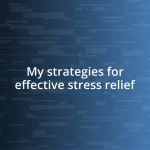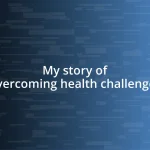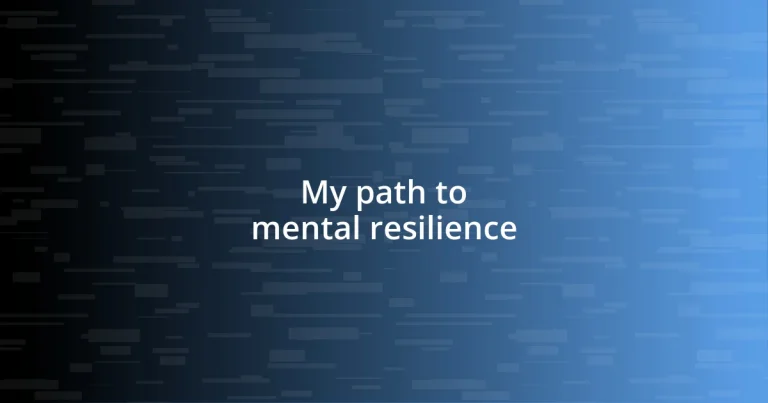Key takeaways:
- Mental resilience involves transforming challenges into growth opportunities and requires self-reflection and emotional awareness.
- Building a support network and embracing diverse perspectives are crucial for navigating hardships and enhancing resilience.
- Setting achievable goals and regularly measuring emotional progress can reinforce the journey towards increased mental resilience.
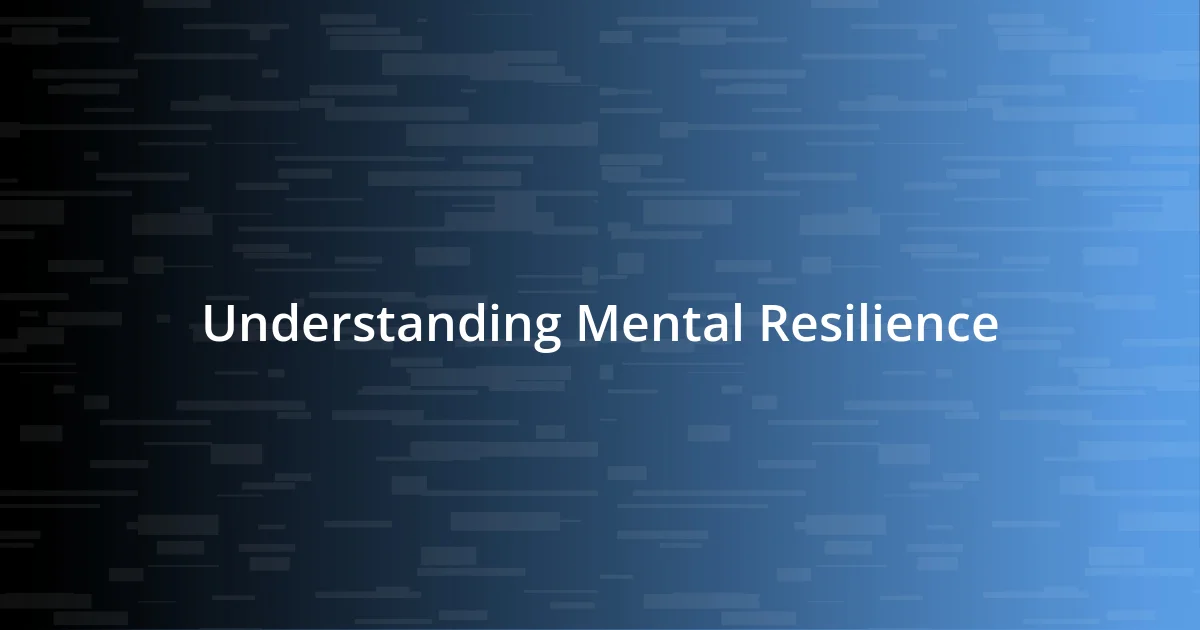
Understanding Mental Resilience
Mental resilience is more than just bouncing back from difficulties; it’s about transforming challenges into opportunities for growth. I remember a time when I faced a particularly tough situation at work. Instead of viewing it as a setback, I chose to see it as a chance to learn and develop new skills. This shift in perspective opened doors I never expected, highlighting how resilience is often about our mindset.
Have you ever noticed how some individuals seem to thrive amid chaos while others struggle? That’s part of what makes mental resilience so fascinating. It involves understanding one’s emotions and reactions, which takes practice and self-reflection. Personally, I’ve learned that when I take the time to recognize my feelings during stressful moments, I can respond with clarity instead of reacting impulsively.
Resilience also requires a support system; no one truly thrives in isolation. I think about the friends and mentors who have guided me through challenging times. Their encouragement and insights acted as a gentle reminder that vulnerability is okay, and it’s often in sharing our struggles that we find strength. This interconnectedness is a core aspect of how resilience flourishes.
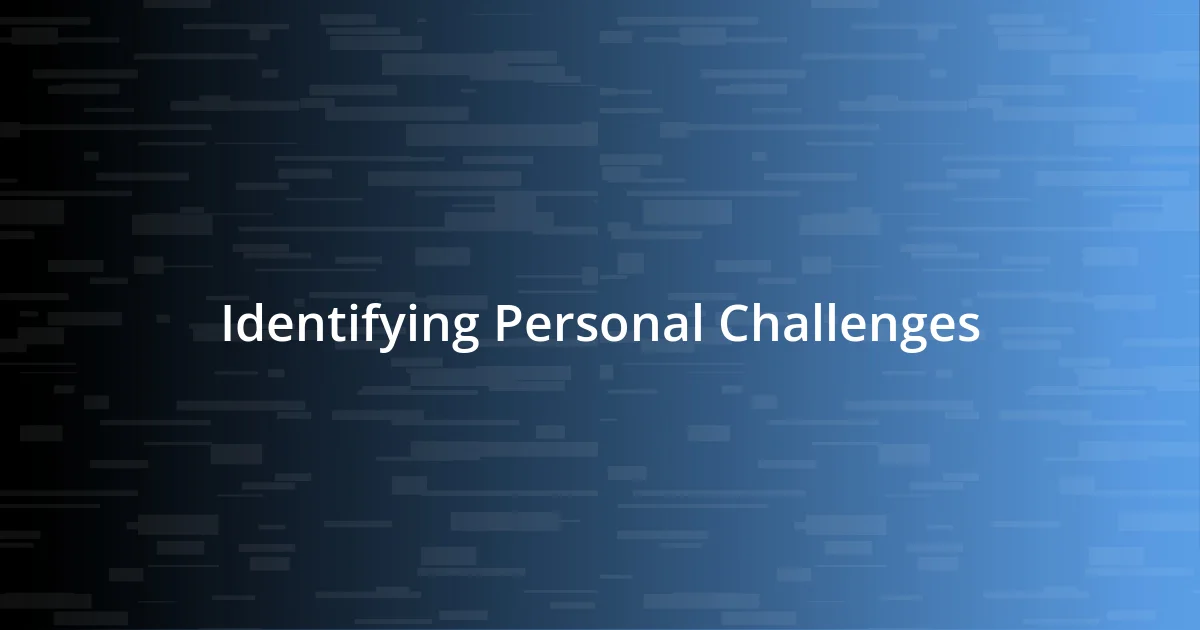
Identifying Personal Challenges
Identifying personal challenges is a critical step toward building mental resilience. For me, pinpointing what truly troubles me often requires quiet reflection. I remember sitting alone in my favorite coffee shop, just me and my thoughts, trying to unravel the source of my anxiety. It was in that moment, watching the world outside, that I realized my biggest challenges often lay in unexpressed emotions. I started keeping a journal, and through that simple act, I could clearly see what was weighing me down.
Here are some common personal challenges to consider:
– Career-related stress: Are you feeling overwhelmed or unfulfilled at work?
– Relationship issues: Do you find it challenging to communicate with loved ones?
– Financial pressures: Is budgeting making you anxious or stressed?
– Health concerns: Are physical health issues impacting your mental well-being?
– Self-image: Do negative thoughts about yourself lead to feelings of inadequacy?
Recognizing these difficulties is vital. It’s the first step in addressing them, and I’ve found that each challenge faced is not just a problem but also an opportunity to better understand myself.
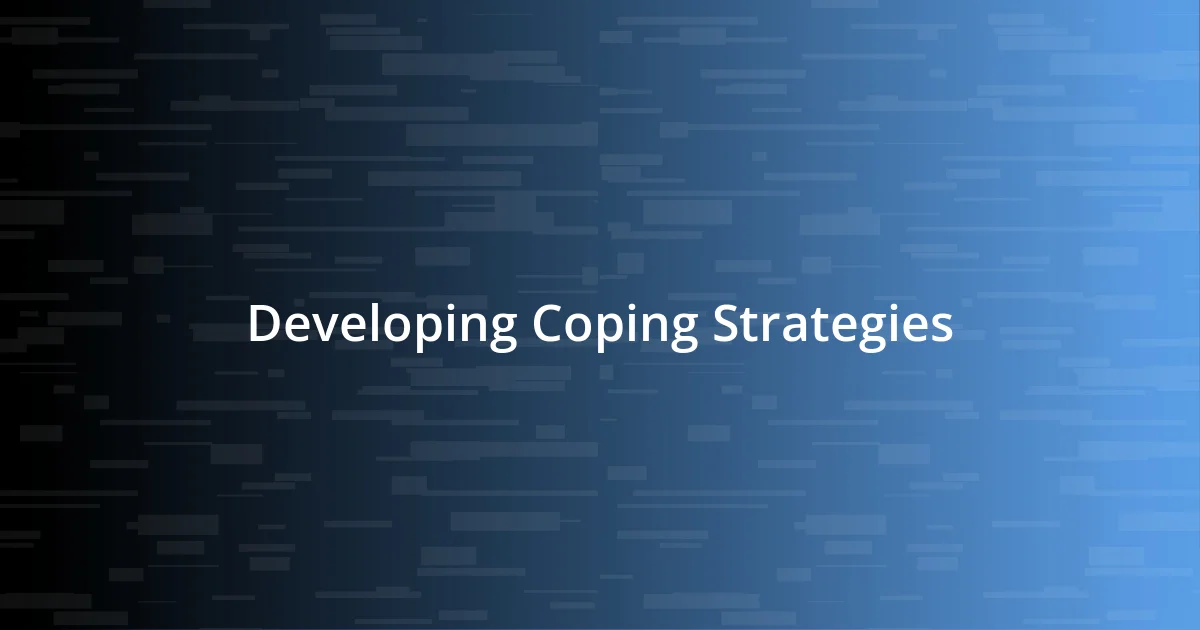
Developing Coping Strategies
Developing coping strategies is an essential aspect of enhancing mental resilience. One approach I have found helpful is creating a personalized toolkit that includes various techniques. For instance, I often rely on mindfulness exercises when I feel overwhelmed, and this practice has taught me to anchor myself in the present. Every time I notice my mind racing, taking just a few deep breaths can dramatically shift my perspective.
Another strategy I’ve embraced is embracing humor during tough times. There was a period in my life when everything seemed to go wrong all at once. I vividly recall telling a friend, “At least I’ve found a new way to fail spectacularly!” This lighthearted take helped alleviate some of the tension in that moment and allowed me to see the humor in adversity. Finding laughter even amidst chaos turns those moments into learning experiences.
Lastly, I’ve discovered the power of routine. Establishing a daily schedule gave me a sense of control during uncertain times. For instance, incorporating morning walks became my go-to method for starting the day on a positive note. As each step took me closer to clarity, I learned that having a consistent framework can reinforce my ability to cope with whatever life throws my way.
| Coping Strategy | Description |
|---|---|
| Mindfulness | Using breathing and meditation techniques to stay present. |
| Humor | Finding lightness in difficult situations to reduce stress. |
| Routine | Establishing daily habits that provide structure and stability. |
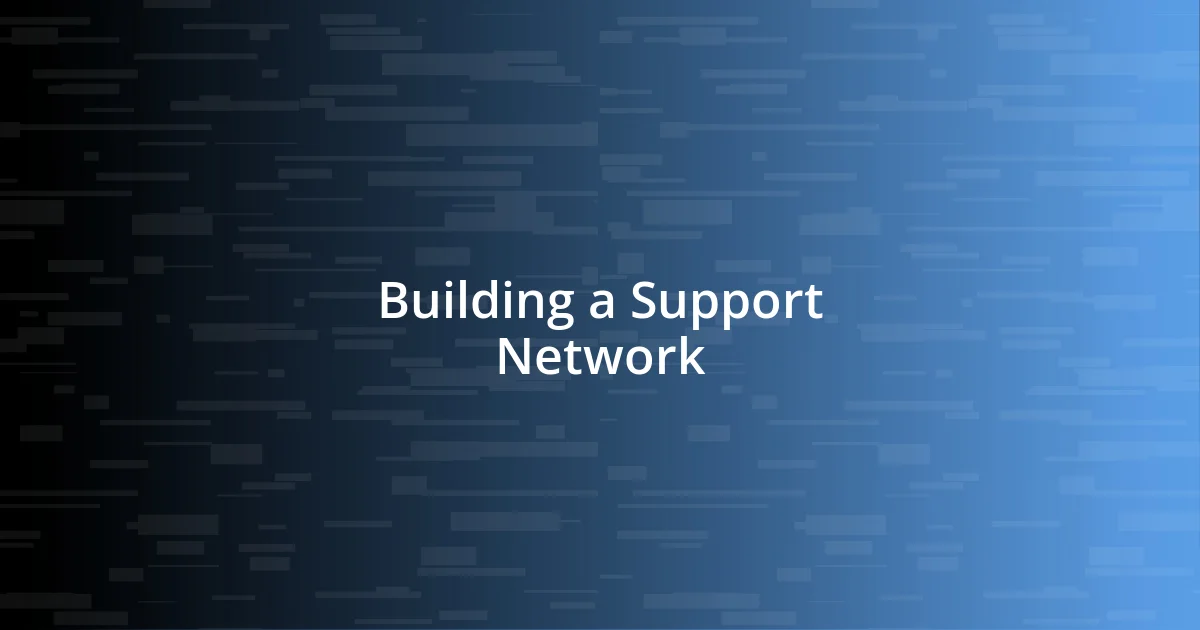
Building a Support Network
Building a strong support network is a core element of mental resilience. I still remember the first time I reached out to a close friend after feeling completely overwhelmed. It felt surprisingly daunting—what would they think? But when I finally opened up, their understanding and encouragement made all the difference. I realized then how vital it is to surround ourselves with people who truly listen and support us during our toughest moments.
I’ve found that friendships aren’t just about shared laughs; they’re essential lifelines during hardships. Last year, when I faced a particularly challenging period, one friend made it a point to check in with me every day. Just a simple message asking how I was doing made me feel less alone. This experience taught me the importance of not just seeking support but also being a source of strength for others. Who in your life could use a bit more support from you right now?
Moreover, I believe in embracing the diversity of perspectives within my support network. In my journey, I’ve connected with people from various backgrounds, and their insights have broadened my understanding of resilience. A wise mentor once shared that every experience is a lesson, and each individual adds a unique piece of wisdom to our collective puzzle. When we lean on our networks, we invite a rich tapestry of experiences that can illuminate new paths through our challenges. Isn’t it comforting to know that we don’t have to navigate these journeys alone?
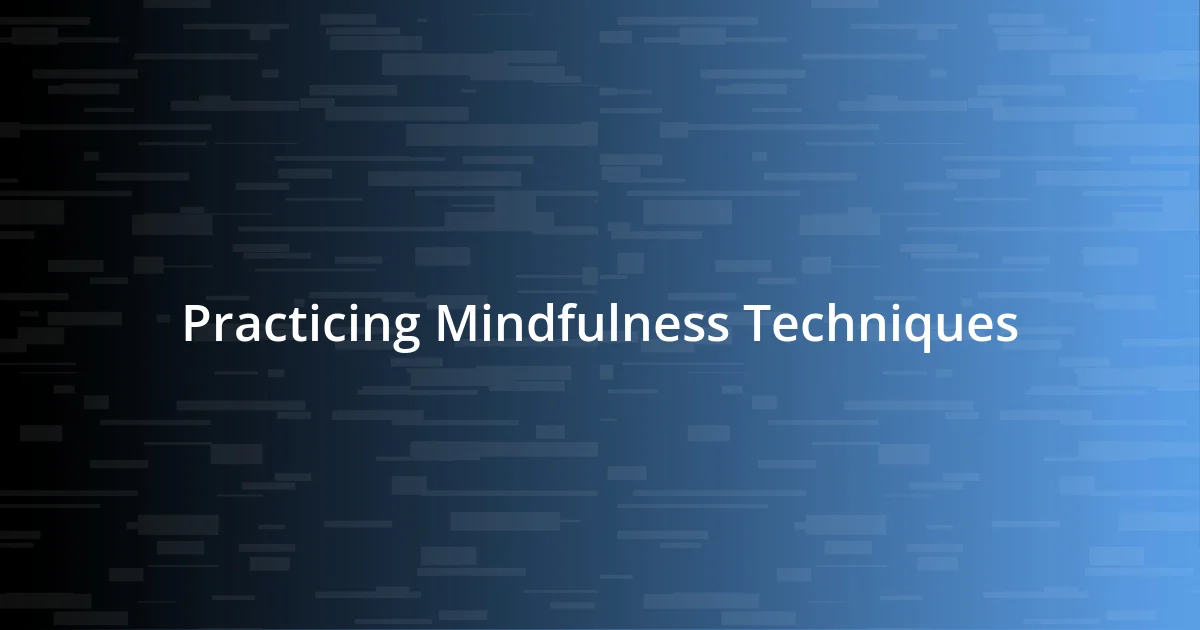
Practicing Mindfulness Techniques
Practicing mindfulness techniques has become a transformative part of my daily routine. I often pause throughout the day to take stock of my surroundings, whether it’s the soft rustle of leaves or the warmth of sunlight on my face. There are days when I catch myself getting lost in worries; in those moments, I recall a friend’s suggestion to focus on my breath instead. It’s amazing how a simple act of inhaling and exhaling can bring me back to center.
One technique that has proven effective for me is body scanning, a method where I mentally check in on different parts of my body. I remember lying on my yoga mat one afternoon, focusing on each muscle, releasing tension, and feeling surprisingly lighter afterward. Have you ever tried it? It’s as if you’re giving your body permission to relax, and the relief is palpable.
Incorporating mindfulness into my life has also meant allowing for intentional stillness. I recall a time I sat on a park bench, simply observing the world around me. I noticed how the clouds shifted slowly and how time seemed to dissolve in that moment. This stillness isn’t just about being quiet; it’s about embracing the full spectrum of thoughts and feelings without judgment. Each of these experiences reinforces for me that mindfulness isn’t just a practice—it’s a way to cultivate a deeper connection with myself and the world around me.
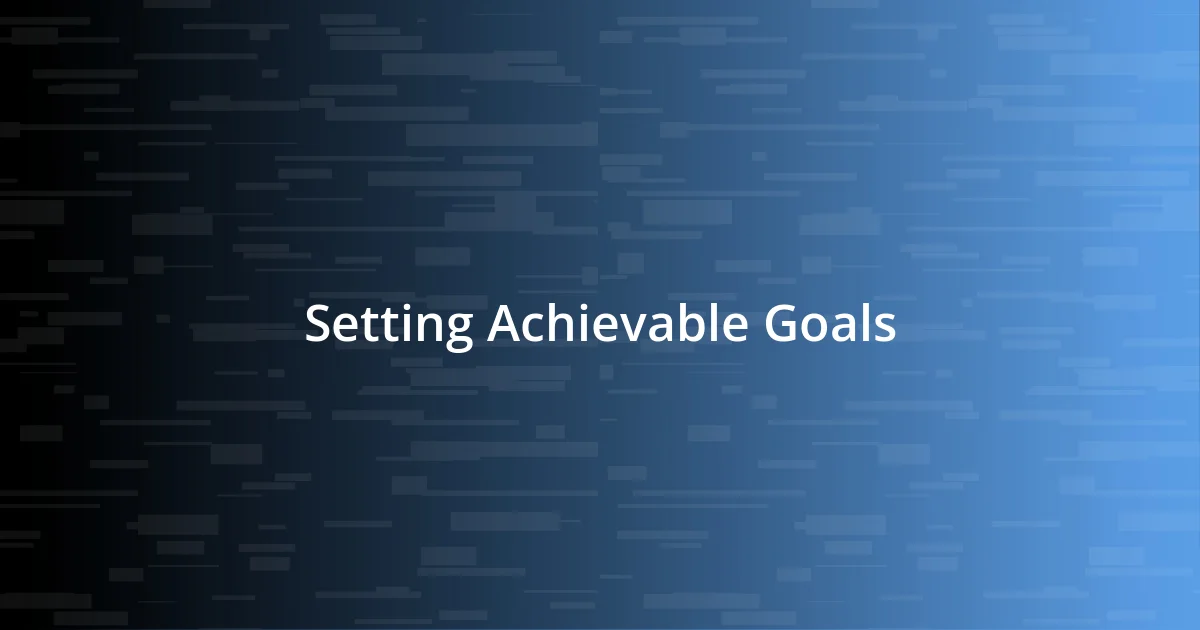
Setting Achievable Goals
Setting achievable goals is essential for maintaining momentum in our journey toward mental resilience. I distinctly remember how overwhelmed I felt when I tried to tackle everything at once during a tough time in my life. Breaking my ambitions into smaller, manageable goals helped me regain a sense of control. For example, instead of aiming to read an entire book in a week, I set a simple goal to read just a few pages each day. That small victory felt rewarding and motivated me to keep going.
Sometimes, it’s about being realistic in our aspirations. I once thought that taking on a new fitness routine would fix everything, but I quickly realized that aiming for a rigorous daily workout was too much. Instead, I adjusted my goal to incorporate just two 20-minute sessions a week. This shift made it easier to stick with the plan and actually enjoy it. Have you ever adjusted your expectations? It’s a powerful reminder that even slight changes can lead to meaningful progress without the burden of undue stress.
Tracking progress is another vital aspect of setting and achieving goals. I’ve made it a habit to jot down my small wins in a journal, which allows me to reflect on how I’m moving forward. One time, after a particularly emotionally draining week, I noted even the tiniest accomplishment—like cooking a new recipe. It might seem trivial, but celebrating these small milestones helped me appreciate the journey rather than just focusing on the finish line. What would you include in your own “small wins” list? Remember, each step counts, and recognizing that can truly enhance our resilience.
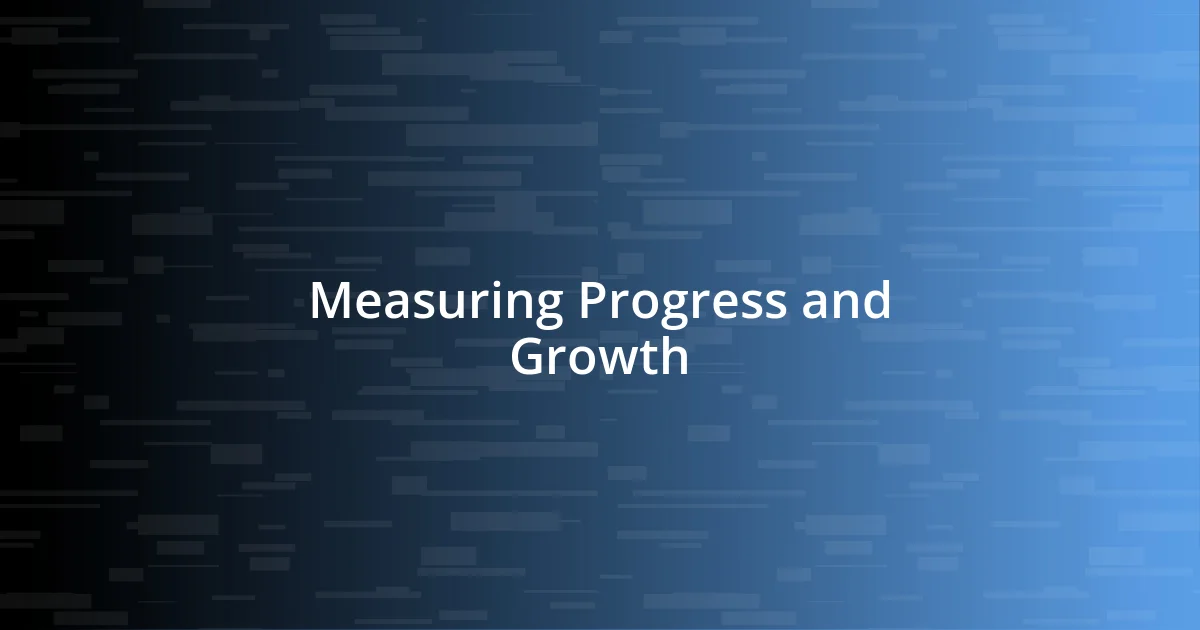
Measuring Progress and Growth
Measuring progress and growth can often feel like a daunting task, yet I’ve found it can be as simple as tuning into how I feel over time. One evening, while reflecting on my journey, I noticed how my response to stressors had evolved. In the past, a minor setback would send me into a tailspin, but now, I find myself responding with curiosity rather than panic. Isn’t it fascinating how shifting mindsets can reflect real growth?
I’ve also embraced the idea of self-assessment through regular check-ins. I remember setting aside a Sunday afternoon for a personal reflection session. I asked myself poignant questions—what moments sparked joy? Which challenges felt lighter to bear? Writing down my thoughts illuminated pathways of resilience I hadn’t noticed before. Have you ever taken the time to assess your emotional landscape? It can uncover insights that flicker in the background but deserve the spotlight.
Another practical approach for measuring my growth is comparing where I was emotionally six months ago to today. It’s like standing on a bridge, looking back at the river of my experiences. I recall feeling lost in a sea of anxious thoughts, yet now I can navigate those waters with a sense of calm. How liberating it feels to acknowledge that I’ve built a stronger foundation! Tracking these shifts, whether through journaling or simply taking a moment to savor the present, helps me appreciate not just the destination but the entire journey of becoming more resilient.






